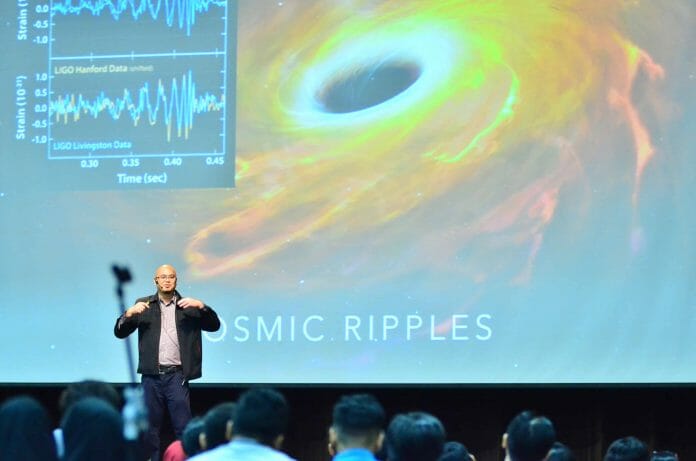Multimedia University (MMU) conferred the Faculty of Engineering Alumni Achievement Award to Dr. Kevin Koay, an MMU alumnus in the breakthrough of black hole image taken in April 2019.
The award was delivered by Prof. Datuk Ts. Dr. Ahmad Rafi Mohamed Eshaq, the President of MMU during a Public Talk entitled “From Cyberjaya To The Event Horizon Of A Black Hole” at Dewan Tun Canselor, MMU Cyberjaya.
Rafi says that the university is proud to have Dr. Kevin Koay to be part of the discovery team in the most momentous breakthroughs of astronomy history. “It signifies that hard work, paired with good guidance from excellent teachers and lecturers, could go a long way in bringing about not only success, but satisfaction in one’s work,” he says.
Prof. Rafi described the talk is important for Malaysia. “To us, Dr. Kevin is considered as one of our heroes, since he is able to inspire others to find success in what they love. Malaysia needs more scientists and engineers. We hope that Dr. Kevin inspires more people towards embracing technology, not just as tools, but as careers,” he adds.
Although his audience was not limited to engineers, Dr. Kevin was very generous with the technicalities of his work, which he is clearly passionate about. While he began with his personal background, it wasn’t long before he spoke about his work – black holes.
Black holes are one of the universe’s biggest mysteries. An enigma since their discovery, it wasn’t too long ago that many considered the sight of black holes as something we could only illustrate but never truly see; after all, how could anyone find a hole that is black, in the dark nothingness of space, trillions of kilometres away.
By linking up a group of telescopes scattered across the globe, the team of more than 200 scientists took a picture of the area surrounding the black hole in the centre of galaxy M87.
The Event Horizon Telescope team have done what has long been thought impossible. While the study of black holes is seemingly far removed from the daily concerns of the majority of people, its impact to the layperson is surprisingly strong.
For instance, consider the global positioning system (GPS) which enables our satellite navigation systems. The highly-accurate GPS is made possible through Albert Einstein’s General Theory of Relativity (GtoR). Without the GToR, sending satellites into space would be much, much harder, if not impossible.
Due to the fact that black holes break our current understanding of the laws of physics, studying black holes could help scientists determine whether what ever it is they’re working on conforms to the GtoR, or not. The conformity could be the difference between success and failure.
In other words, the key to better and safer navigation for us mere mortals could lie in the study of black holes.









